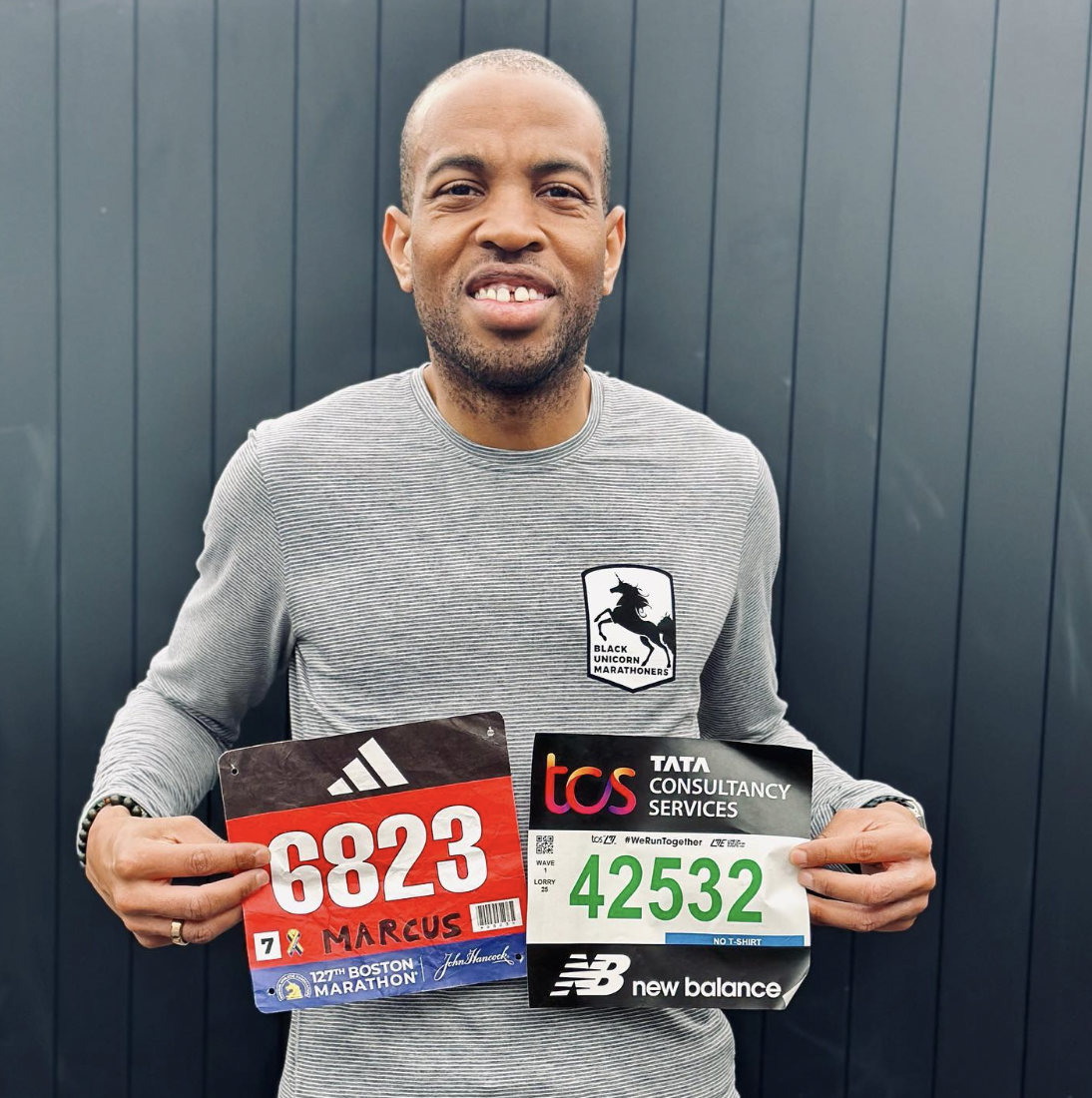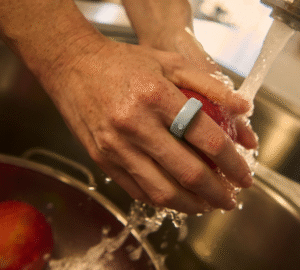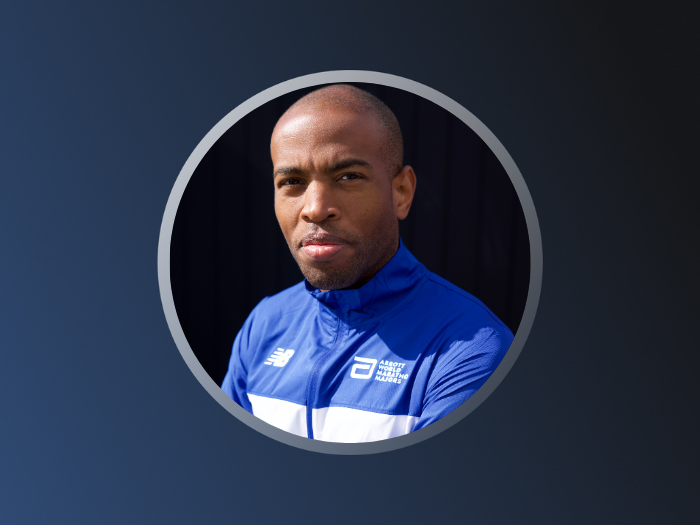Who: Marcus B., 39, London
Surprising Oura insight: After a long run, Marcus is accustomed to seeing rises in his resting heart rate. But if it’s 10 beats or higher per minute, it’s a sign he needs to take that day off to rest.
Marcus is an avid marathon runner. Recently, he ran the London Marathon and Boston Marathon, achieving an impressive sub-three-hour time in both. His commitment to running extends beyond his own personal endeavors; he started a local running group, a podcast about running, a coaching business, and joined the Inclusion Advisory Group set up by London Marathon Events.
Marcus is on a mission to bring more diverse people into running, to build a community of people who can experience the boost in life satisfaction that he has felt since picking up the sport. When he’s not running, he’s juggling a full-time job in construction and taking care of his young children.
Why did you decide to become an Oura member?
In my mid-20s I started running after a bet with my friend. I started doing 10Ks, then half-marathons, then marathons. Over this period, I learned how important recovery was. I noticed other runners used Oura to help them with their training and routine, so I decided to get one too.
Initially, I just wanted to track my sleep and see how my body was responding to my training, but over time, I started getting useful insights from other metrics – like my morning body temperature trend.
| “Oura takes the guesswork out of training. It’s the first thing I look at in the morning and I use the data to inform when to rest and when to push my body without solely depending on how I feel.” |
How does Oura help inform your training and recovery?
Preparing for a marathon is very taxing on the body. You have to run a lot leading up to it, and make sure you’re getting adequate rest between sessions. But I have children, a full-time job in construction, and a part-time job as a running coach – so it’s not as easy for me to have optimal recovery. This makes it even more important that I have objective data on how my body is doing.
For example, in the morning after a long run, I check my resting heart rate. If my resting heart rate is elevated, it’s a sign that my body is working hard to recover. A small elevation is fine, but if it’s elevated by ten beats per minute, or higher, it’s time to rest.
READ MORE: What Is the Average HRV?
I also started using my morning body temperature trend as a key signal on my recovery. It’s really common for marathon runners to get sick often, because of the intensity of their training. When my body temperature is elevated in the morning, I know that my body is run down and more likely to catch a cold. So I scale back the training.
Overall, Oura takes the guesswork out of training. It’s the first thing I look at in the morning and I use the data to inform when to rest and when to push my body without solely depending on how I feel.
Tell us about your training and recovery routine as you prepared for your back-to-back marathons.
Recently I ran back-to-back sub-three-hour marathons: the London marathon, and then six days later, the Boston marathon. This is hard on the body, so it’s extremely important that your body and mind are prepared.

To help my body prepare, I built a good aerobic base by doing plenty of base runs and long runs. But that’s only a piece of the puzzle – it’s vital to ensure you’re hydrating properly before and after a run, fueling your body, and sleeping well.
READ MORE: Why Sleep Matters
The downfall of many runners is under-fueling. I eat protein at every meal, a good amount of carbs before and after a race, and plenty of vegetables. Runners have to have a fairly bland diet because long runs can cause gastrointestinal issues. So I mainly stick to the same primary food sources, like rice, chicken, steak, fish, and vegetables.
As I near the race, I mainly stick to rice and grilled chicken and avoid anything very high in fat, like fried food. I also reduce my fiber intake to make it easier for digestion. Practicing a consistent diet makes it predictable for my body, so nothing gets in the way of my training schedule and race day performance.
In terms of preparing your mind, another Oura feature that I’ve benefited from is the meditation sessions in the Explore content. I follow a guided meditation before a marathon, to help me chill out and relax.
READ MORE: Try Oura’s Guided Sleep Meditations for Deep and Restful Sleep
What does running mean to you?
If you start running for external reasons – to prove a point or for aesthetics – it’s unfulfilling. I’ve really had to remind myself of my “why” many times.
Being a runner is more than running races. It’s about being present for yourself and for your children. I’m sure that people will see me running back-to-back marathons and assume all I care about is being as fast as possible. Races are important to me, but they’re not the be-all and end-all. Your speed won’t always be there – but running will.
READ MORE: Is It Good to Have a High Heart Rate During a Workout?
What advice would you give someone interested in becoming a runner?
Running can be intimidating, but everyone starts somewhere. When I first ran the London marathon, my time was 4 hours and 55 minutes, but now it’s sub-three. That didn’t happen overnight!
For my podcast, A Runner’s Life, I have more than 150 episodes interviewing successful runners. I’ve learned through interviewing these people that there’s no secret for running–no secret training protocol or special diet. You just have to do the work. So if you want to become a runner, you have to first do the thing, then you become the person.
It’s also essential that you have fun. Running can be hard, so you’ve got to actually enjoy it. Many people trip up by being too serious too soon, but running is a long-term lifestyle change. You don’t have to run marathons to be a runner – it’s about having fun and finding community.
Communities can be very beneficial. I’m part of a local running group and on the committee of the Inclusion Advisory Group set up by London Marathon Events. The goal is to get more diverse people into running – many people are underrepresented in running so that has been important to me.
At the local running club I’ve been setting up, there’s a great mix of people – people of color, the LGBTQ+ community, men, women, old and young people, all with different interests and backgrounds. I wouldn’t have met most of these people had it not been for running.
Ultimately, being part of a community helps your life satisfaction. Running has given me this community, and so much more.
RELATED: This Oura Member (and Employee) Is Attempting to Break a Running World Record
What’s Your Oura Story?
Everyone’s story is unique, and we’d love to hear yours. Share your story here.











